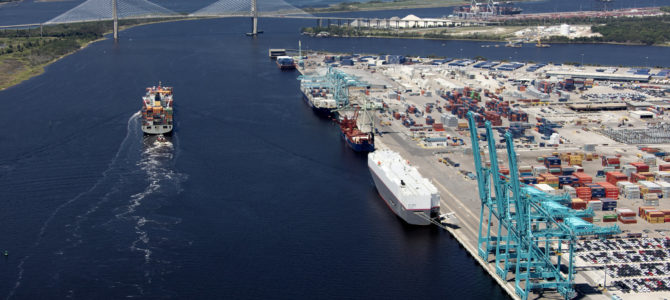
Now that legislation on “Trade Promotion Authority” is ready to drop, the debate over TPA, the Trans-Pacific Partnership agreement it’s intended to permit, and broader U.S. trade policy will hit a fever pitch. Unfortunately, the bulk of what you’ll hear from TPA supporters and opponents, as well as the journalists covering them, is at best misguided and at worst flat-out wrong.
First, contrary to what you might hear from President Obama and congressional leadership, the TPP and reciprocal trade policy generally represent a far-from-perfect approach to U.S. trade policy. As I explained for The Federalist in 2013, there are at least five fundamental flaws with engaging in long, drawn-out negotiations through which the United States only agrees to lower its nonsensical, immoral trade barriers if other countries agree to do the same:
First and most basically, it is economically ignorant. Since Adam Smith first penned The Wealth of Nations, there has been a near-universal economic consensus in support of the elimination of trade barriers regardless of whether other nations do likewise… Second, the reciprocity model has proven increasingly ineffective in producing tangible trade liberalization gains for U.S. businesses and consumers… The third flaw in the current system is that it’s needlessly messy and archaic…[due to FTAs’ varying rules] the exact same product will be subject to different taxes and rules based solely on its origin and the year in which it enters the country, and U.S. businesses often make sourcing decisions based on FTA rules rather than a product’s actual value…. Fourth, the United States’ “free trade” policy has proven to be a horrible tool for actually achieving and sustaining public support for trade liberalization and free markets…. Finally, the current approach to U.S. trade policy is manifestly immoral…. The protectionist policies that USTR fights to maintain are the result of productive resources being diverted to achieve political ends and, in the process, taxing unsuspecting consumers to line the pockets of the special interests that succeeded in enlisting the weight of the government on their side.
Given these (and other) facts, free marketers generally agree that bilateral and regional FTAs like the TPP are a “third best” approach to trade liberalization, after unilateral liberalization (i.e., just eliminating our corrosive trade barriers without asking another country’s permission to do so) and multilateral liberalization (i.e., getting almost every country in the world to make same basic free-trade commitments through the World Trade Organization).
Nevertheless, because we don’t live in a perfect world (stop laughing), bilateral FTAs remain the only game the U.S. government is seriously interested in playing, the TPP is almost concluded, and U.S. FTAs are, on balance, still better than the protectionist, anti-market status quo. As my Cato colleague Bill Watson and I explained last November:
Although unilaterally eliminating import and export barriers is the most direct and obvious way to maximize the moral and economic gains from trade, the reason we’ve seen substantial liberalization of trade over the last half century is because the United States has engaged in ‘reciprocal’ agreements like NAFTA and the GATT that lower trade barriers at home and abroad. The value of reciprocal agreements is primarily political: by tying open domestic markets to open foreign markets, reciprocal agreements counterbalance opposition from import-competing businesses with support from exporters who both benefit from new market access and face potential retaliation from trading partners for any protectionist backsliding by the U.S. government.
While imperfect, reciprocal trade deals still generate significant, positive economic results and enhance consumer freedom. As a result, there is quite literally no mainstream policy on which economists—left, right, and center—agree more than U.S. FTAs.
For these reasons and others, free marketers generally hold their noses and support FTAs because some additional freedom is better than none. So where does that leave TPA? Well—
Although trade agreements provide a mechanism for overcoming political opposition to free trade, they also create new political problems of their own, most of which stem from the inherent conflict in the U.S. Constitution between the power granted to Congress to “regulate commerce with foreign nations” (Article I, Section 8) and that granted to the president to negotiate treaties (Article II, Section 2) and otherwise act as the ‘face’ of U.S. international relations. In short, the executive branch is authorized to negotiate trade agreements that escape much of the legislative sausage-making that goes in Washington, but, consistent with the Constitution, any such deals still require congressional approval—a process that could alter the agreement’s terms via congressional amendments intended to appease influential constituents. The possibility that, after years of negotiations, an unfettered Congress could add last-minute demands to an FTA (or eliminate its biggest benefits) discourages all but the most eager U.S. trading partners to sign on to any such deal.
TPA, also known as ‘fast track,’ was designed to fix this problem. TPA is an arrangement between the U.S. executive and legislative branches, under which Congress agrees to hold a timely, up-or-down vote (i.e., no amendments) on future trade agreements in exchange for the president agreeing to follow certain negotiating objectives set by Congress and to consult with the legislative branch before, during, and after FTA negotiations. In essence, Congress agrees to streamline the approval process as long as the president negotiates agreements that it likes.
Word on the street is that the Japanese government (and likely others) won’t finalize the TPP until TPA has passed (and, given our Congress, who can blame them?). Hence, the current legislation and the pressure on the Obama administration and Congress to pass it, as well as the intense opposition from anti-trade groups (unions, uncompetitive manufacturers, misguided environmentalists and economic isolationists, etc.).
Trade Myths and Realities
As Watson and I discuss, the myths TPA opponents are peddling are myriad:
First, the claim that TPA unconstitutionally cedes power over trade policy to the executive branch ignores the actual text of the law and the agreements that it governs…. Second, TPA does not enable trade agreements to be negotiated in secret, and this claim, in fact, gets things completely backwards…. Third, TPA and U.S. trade agreements are not an assault on American sovereignty, contrary to the ‘Obamatrade’ claims.
For these reasons, we explain why the Tea Party should (and, contrary to media misperceptions, pretty uniformly does) support TPA, as well as the FTAs that it’s intended to facilitate.
On the other hand, TPA and TPP supporters are peddling their own nonsense, even beyond their willful blindness to the benefits of unilateral trade liberalization. Not only are they exaggerating TPP’s benefits—it will not have a huge economic impact on the U.S. and global economies, nor will it solve U.S. foreign policy in the Asia-Pacific—but they’re also using the same, tired mercantilist rhetoric that defies basic economics and breeds Americans’ misguided, trade-deficit-obsessed opposition to free trade. Never once, it seems, do these folks consider the political repercussions of their over-the-top predictions’ inevitable failures. And that’s a shame.
No One Is Really Happy with This Trade Deal
Even worse, the Obama administration, in an attempt to sell the TPP to trade-skeptical lefties, has promoted the agreement as “most progressive trade agreement in history” that, with input from labor unions and environmentalists, will protect American workers and impose strict labor and environmental standards on the developing world—pretty much the exact opposite of what you’d want in a “free market” agreement.
Meanwhile, there are legitimate concerns among liberals, conservatives and libertarians alike about the TPP’s carve-outs for favored interests like automakers, textile manufacturers, and sugar growers, as well as its aggressive intellectual property and investment rules.
As painful as this stuff is to hear and read, however, it shouldn’t obscure the basic fact of what FTAs are and do:
The political wrangling that goes into creating reciprocal trade agreements is messy, but they have thus far proven to be the most successful mechanism to substantially reduce U.S. trade barriers. Without our FTAs, protectionist rent-seeking could close the United States off from the global economy, and Americans would be stuck working harder for less money. If politicians were angels, FTAs wouldn’t be necessary. But we all know better, now, don’t we?
Indeed, we do, and because many of the most onerous U.S. trade barriers are on industrial inputs and basic essentials—especially food—a vote for TPP is a vote for lower taxes on American families and industrial consumers.
Some of the worst US food tariffs: Nuts: 131.8% Sardines: 35% Pineapples/avocados: 29.8% Various meat: 26.4% Various dairy: 20% Garlic: 20%
— Scott Lincicome (@scottlincicome) March 24, 2015
High US tariffs on fruit/veggies Pears: 29.8% Squash: 21.3% Br sprouts: 20% Soybeans: 19.1% Melons/cherries: 17% Yams: 16% But eat healthy!
— Scott Lincicome (@scottlincicome) March 24, 2015
Unless the TPP ends up containing some truly horrible new provisions, these benefits should once again carry the argument.
So if you’re just now tuning into the debate over TPA and TPP, seeking to make an informed decision about them, ditch the hysteria and apply these two basic rules:
First, if grassroots conservatives feel strongly about free-trade purity and the faults of the reciprocal trading system, then they can and should feel free to criticize TPA and President Obama’s troublesome negotiation of U.S. FTAs on these very legitimate grounds. For the reasons outlined, we disagree with that stance because FTAs represent the only realistic means of liberalizing trade in the current political environment, but we can’t fault critics’ intentions or principles….
Second, if TPA fails in Congress, there will be plenty of blame to go around: a Democratic Party that has abandoned the longstanding pro-trade consensus in the United States, a Republican Party committed to corporatist carve-outs and subsidies that undermine FTAs’ free market goals, and, perhaps most at fault, a president who has never—not once—put trade policy principles ahead of his and his party’s base political ambitions…. However, after almost six years in existence, the Tea Party and its congressional champions have repeatedly demonstrated their unparalleled commitment to free markets and free trade. Thus, unless the Tea Party and its friends in Congress radically change course (and ignore our first conclusion), any reporter who blames the Tea Party for the failure of U.S. trade policy is ignoring reality and committing journalistic malpractice.
These facts, not hysteria, should guide the current trade debate. If history is any guide, however, they’ll be as absent as the president over the next few weeks.









